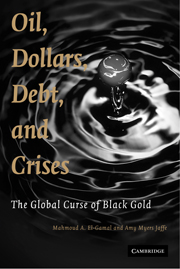Book contents
- Frontmatter
- Contents
- List of Illustrations
- List of Tables
- Foreword
- Preface
- 1 The Challenges of Resource Curses and Globalization
- 2 New Middle East: Childhood 1973–84 and Adolescence 1985–95
- 3 Road to the Status Quo: 1996–2008
- 4 Globalization of Middle-East Dynamics
- 5 Dollars and Debt: The End of the Dollar Era?
- 6 Motivations to Attack or Abandon the Dollar
- 7 Resource Curses, Global Volatility, and Crises
- 8 Ameliorating the Cycle
- Conclusion
- Notes
- Bibliography
- Index
Foreword
Published online by Cambridge University Press: 05 June 2012
- Frontmatter
- Contents
- List of Illustrations
- List of Tables
- Foreword
- Preface
- 1 The Challenges of Resource Curses and Globalization
- 2 New Middle East: Childhood 1973–84 and Adolescence 1985–95
- 3 Road to the Status Quo: 1996–2008
- 4 Globalization of Middle-East Dynamics
- 5 Dollars and Debt: The End of the Dollar Era?
- 6 Motivations to Attack or Abandon the Dollar
- 7 Resource Curses, Global Volatility, and Crises
- 8 Ameliorating the Cycle
- Conclusion
- Notes
- Bibliography
- Index
Summary
The current economic and financial crisis – by all appearances, the worst since World War II – has already generated a vast amount of commentary. Some have been polemical. Some have been measured. Analysis has ranged from the well informed to the superficial. But most have, understandably, focused on the immediate causes of the crisis. An unsustainable real estate bubble, shoddy credit standards, disastrous risk management by major banks, counterproductive incentives for managers, the rise of esoteric and unregulated financial instruments, and broad-scale failure by regulatory agencies are just a few of them. All are important. And all will need to be addressed by policy-makers and financial executives as they forge strategies to avoid similar crises in the future.
Yet there are even larger factors at work. A number of observers, for instance, have stressed the role of structural global imbalances in creating an environment conducive to the world-wide financial turmoil witnessed in 2008. Surely, the perverse Sino-American financial relationship – under which, essentially, relatively poor Chinese loan their savings to relatively affluent American consumers – played an important part in fostering the loose credit that helped precipitate the current crisis.
Oil, Dollars, Debt, and Crises by Mahmoud A. El-Gamal and Amy M. Jaffe addresses another structural global imbalance. Their subject is the huge transfer of resources from energy-importing to energy-exporting countries. This transfer, prompted by the rise in petroleum and natural gas prices that began in the late 1990s and sharply accelerated in the middle of the present decade, created giant reserves of petrodollars that, in turn, helped to overheat financial markets in the United States and elsewhere.
- Type
- Chapter
- Information
- Oil, Dollars, Debt, and CrisesThe Global Curse of Black Gold, pp. xi - xiiPublisher: Cambridge University PressPrint publication year: 2009
- 1
- Cited by



